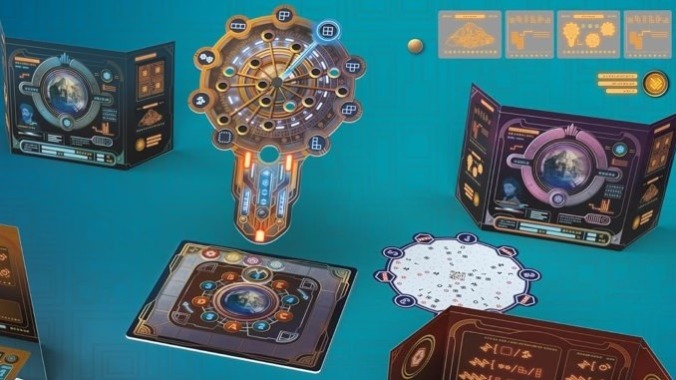Deduction games have a long history on the tabletop, going back to 1949’s Clue and even earlier to some mystery games co-designed by novelist Dennis Wheatley in the 1930s, but the pandemic seems to have generated a new burst of interest in the genre—which makes sense as these are games you can easily play solo and in many cases remotely. The success of 2020’s The Search for Planet X, my #1 new game of that year, also may have helped spur this new wave of deduction games.
Archeologic is a new title in that space that combines deduction with polyomino tiles, two great tastes that should taste great together. From the designer of another acclaimed deduction game, Turing Machine, Archeologic asks players to gather clues to figure out how six polyomino tiles line up on a 5×5 board, but the clues you gather vary in cost and in usefulness. It’s a good concept, but the execution isn’t there, as the mysteries are a little too easy to solve and one of the game’s most important components is too flimsy for how much it’ll be used.
Players in Archeologic compete to be the first to solve the map of a recently-uncovered city. The city has a 5×5 grid and there are six buildings, each with a unique shape covering three or four squares, and each with at least one ‘trap’ space on it. At the start of a game, players learn the locations of anywhere from three to five traps on the map (out of eight total), but not any buildings. They then take turns looking up clues based on the turn marker’s current location, which indicates a row or column on your map.

You can ‘ask’ any of six questions on your turn, some very broad, such as the number of trap boxes in that row/column, and some more specific, such as asking if a specific building is in that row/column and if so how many of its squares are there. The more specific the question, the more it costs you on the turn track, which may give your opponent(s) the opportunity to take multiple turns before you get to go again. If this sounds familiar, it is exactly the way clues and turns work in The Search for Planet X and its sequel game The Search for Lost Species.
Your clues remain secret from other players, so you only gain information from your own turns. Once a player believes they’ve cracked the map, they can use a turn to take a guess, which has the highest cost on the turn track. If you use the QR codes available in the game to access the Archeologic website, you can enter your guess and still remain in the game if you were incorrect, but if you use the answer key in the booklet that comes with the game and are incorrect, you’re eliminated.
Archeologic comes with only 28 puzzles, each of which requires a unique clue disc that you put into the game’s cardboard ‘archeoscope,’ although they promise that more puzzles will be available on their site in the future. I had trouble getting the archeoscope to hold the clue discs steady so I could get the clues, and other users have reported similar issues online, so I think it’s a manufacturing issue (the plastic button that holds the two cardboard pieces together is not large or tight enough) rather than a fluke.
I’d be fine with a lot of these little issues if I thought the base game was stronger, but I’ve played it several times and can figure out the map pretty easily, even though I wouldn’t say I’m anything like an expert at deduction games. (Except Cryptid, which is one of the best deduction games I’ve ever played. I’m good at that one, somehow.) You don’t need many clues to end up able to create just one possible alignment of your six tiles, because they’re large enough and can’t be flipped over so that even one clue should eliminate a number of possible maps. The resulting game is much more in your head, or on paper, than in the game itself, which seems like a huge advantage for adult players and/or those with good visio-spatial ability—leaving younger players behind. I think it works better as a solo game than a competitive one, but that has a limited shelf life with the small number of puzzles included. I’m all for more deduction games on the market but this one fell short of the mental challenge I want.
Keith Law is the author of The Inside Game and Smart Baseball and a senior baseball writer for The Athletic. You can find his personal blog the dish, covering games, literature, and more, at meadowparty.com/blog.

